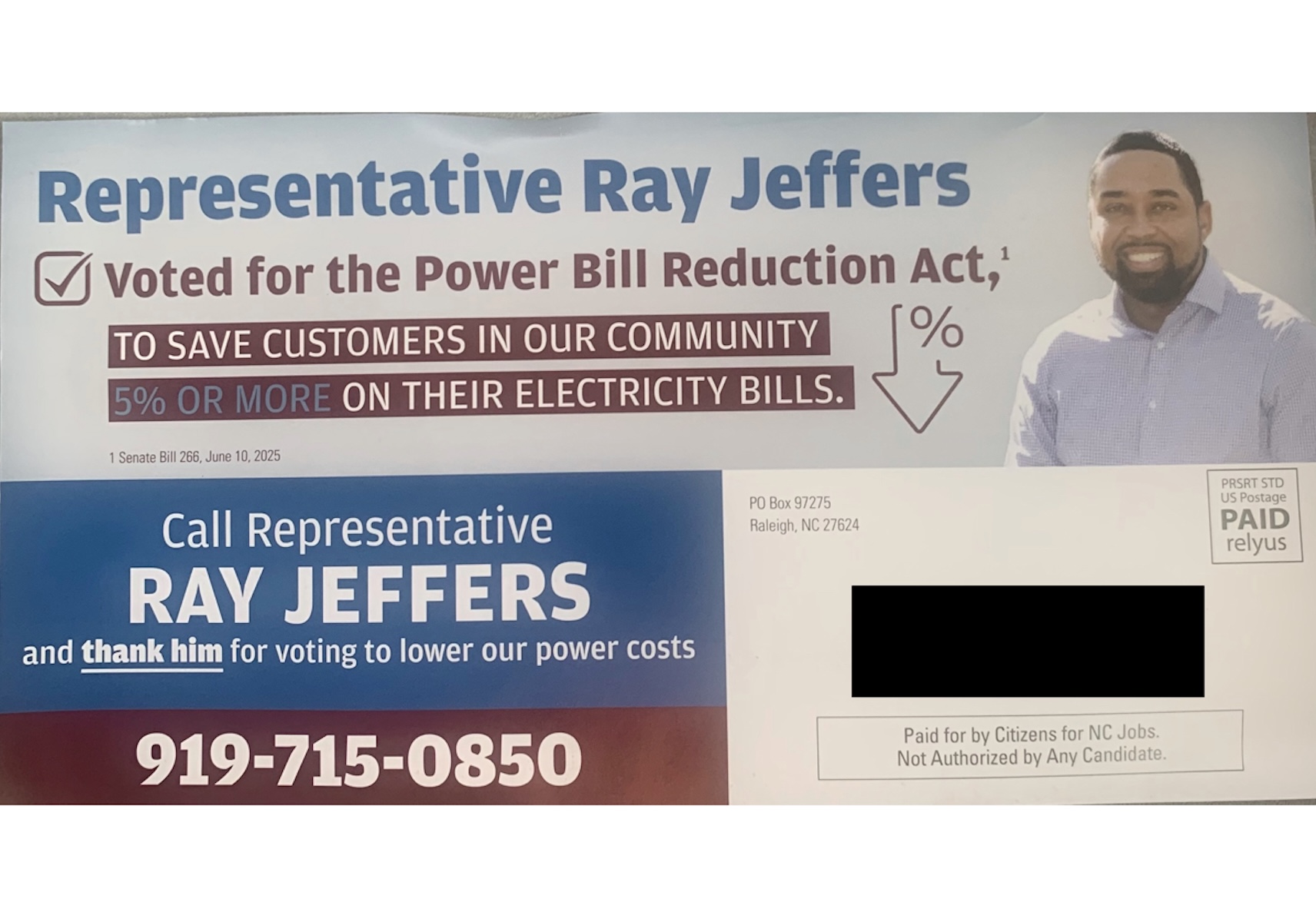Industry front group backs NC bill that raises Duke Energy costs for residential customers

As North Carolina lawmakers prepare to override Gov. Josh Stein’s veto of a controversial energy bill, constituents are receiving mailers from a dark money entity with ties to Duke Energy’s industrial and commercial customers.
Citizens for NC Jobs registered with the state as a nonprofit in January and launched a Facebook page three days after lawmakers introduced the legislation in March. The group is specifically targeting Democrats who voted with Republicans to pass the measure, likely aiming to maintain the members’ support ahead of the override vote.
Senate Bill 266 eliminates Duke Energy’s 2030 carbon emissions limits and shifts costs and risks from the company’s shareholders and industrial customers – including power-hungry data centers – to residential users. Eleven Democrats in the House and three Democrats in the state Senate broke with their party last month and joined the Republican majority to pass the controversial bill.
The measure aims to make building large-scale methane gas and nuclear plants more economically attractive for Duke Energy by forcing customers to pay for them before the plants are operational through a financing mechanism called construction work in progress or CWIP. With CWIP, customers rather than shareholders would be on the hook for repayment if a project falls through. The consequences of CWIP continue to be evident in South Carolina, where Santee Cooper customers are still paying $9 billion for an abandoned nuclear reactor project at the V.C. Summer plant, which never generated power due to delays and cost overruns. After the Summer project collapsed, four executives from a partner utility company involved in the project were criminally sentenced for fraud and lying to federal investigators.
S. 266 would also shift costs from large-load customers to residential users. Currently, Duke Energy’s residential customers in North Carolina use just over 40% of all the power the company purchases, rather than generates itself, and they pay for about 41% of the costs. An analysis by EQ Research found that under S. 266 residential customers would continue to use the same 40% of purchased power but would bear almost 49% of the costs. This cost shift to smaller-load users is being considered as a growing number of power-hungry data centers are eying North Carolina for expansion.
Source: EQ Research
Another analysis released this week by BW Research found that S. 266 would also lead to a loss of over 50,000 jobs and $1.5 billion in unrealized state tax revenue due to a decline in power sector investments, and to a state energy capacity shortfall of as much as 12 gigawatts. The analysis used modeling by the North Carolina Public Staff, which advocates for customers’ interests at the state Utilities Commission.
S. 266 was introduced by former state Sen. Paul Newton, who retired from his job as Duke Energy’s North Carolina president in 2015. He claimed the bill would save the utility’s North Carolina customers $13 billion but did not release the analysis or explain how the figure was calculated. In response, a trio of North Carolina State University professors specializing in utility economics conducted their own analysis of the proposal and found it could potentially raise customers’ bills by $23 billion by 2050 due to volatility in the price of methane gas, upon which Duke Energy is becoming increasingly dependent.
Gov. Josh Stein, a Democrat, vetoed S. 266 earlier this month. He said the bill’s climate provision was “sending the wrong signal to businesses that want to be a part of our clean energy economy,” while the cost-shift section meant “families will pay more so that industry pays less.”
Legislators may vote to override the veto as early as July 29 when the Senate and House reconvene. The House passed S. 266 by a final vote of 75-36 and the Senate by a vote of 29-11. Overriding a governor’s veto requires a three-fifths supermajority of lawmakers present at the time the vote is called, so the margin needed can vary. Assuming full attendance, Republicans hold a supermajority in the Senate, but House Republicans have only 71 members – one short of a supermajority.
Industrial interests tied to the mailers
Constituents of some of the Democrats who voted with Republicans on S. 266 have received mailers from an obscure nonprofit about the upcoming override vote that repeats challenged claims about cost savings to customers and asks recipients to call and thank their representative for supporting it.
The Energy and Policy Institute obtained a copy of the mailer targeting state Rep. Ray Jeffers, a Democrat who voted for S. 266. He represents parts of Durham County and Person County, where Duke Energy is among the largest employers and taxpayers.
The text on the mailer says it was paid for by Citizens for NC Jobs, a nonprofit that registered with the state in January 2025 and launched a Facebook page on March 13, three days after the legislation was initially introduced as S. 261. Newton, the former Duke Energy executive, resigned from the Senate to take another job, and the text was cut from his bill and pasted into a stripped-out S. 266 that had been introduced to speed rebuilding in the western part of the state after flooding from Hurricane Helene.
In paperwork filed with the state, Citizens for NC Jobs disclosed its registering entity as “WASLAW” and gave among its addresses that of Ward and Smith, a North Carolina law firm. Ward and Smith practice before the North Carolina Utilities Commission as counsel for two organizations representing the interests of Duke Energy’s large industrial and commercial customers: Carolina Industrial Group for Fair Utility Rates (CIGFUR) and Carolina Utility Customers Association (CUCA). Susan Vick, a lobbyist for the groups, told EPI that her firm merely registered the paperwork for the nonprofit, has had no further contact, and was unaware of the mailers.
Citizens for NC Jobs’ registration paperwork also lists the exact same mailing and principal office address, down to the suite number, as the North Carolina Chamber, the state’s top business lobby. Duke Energy is a top-tier “Pinnacle” member of the NC Chamber, with a seat on its strategic board. Last year, Duke’s state president Kendal Bowman co-chaired a Chamber fundraising campaign. The NC Chamber did not respond to EPI’s request for comment.
The NC Chamber has lobbied legislators to support S. 266. In an email obtained by EPI, NC Chamber lobbyist Alyssa Morrissey accused Gov. Stein’s veto statement of “cherry pick[ing]” data on the bill’s cost. In lobbying materials reviewed by EPI, the NC Chamber dismissed the N.C. State analysis as a “scare tactic” and urged a vote to override Stein’s veto. In another email obtained by EPI, Morrissey told lawmakers this week that utilities have addressed the methane gas price volatility issue, arguing that they have “various mitigation strategies” to manage it. However, an analysis conducted last year by EQ Research for the Environmental Defense Fund showed that since 2017 methane gas has been the primary driver behind rising Duke Energy electric bills in North Carolina.
The vote to override Stein’s veto of S. 266 will take place in a legislature awash with Duke Energy and other industry money. Over the past decade, Duke Energy has contributed over $2.5 million to North Carolina politics; among its top recipients were Newton’s campaign as well as that of state Sen. Dan Blue, one of the Democrats who voted for S. 266. Over the same period, the NC Chamber has contributed over $438,000 to North Carolina politics, and Newton and Blue were also among its top beneficiaries. On Aug. 13, Blue will be among the featured speakers at a Citizens for NC Jobs conference in Wrightsville Beach, North Carolina, along with U.S. Rep. Tim Moore, state Senate leader Phil Berger, and state House Speaker Destin Hall, all Republicans.



